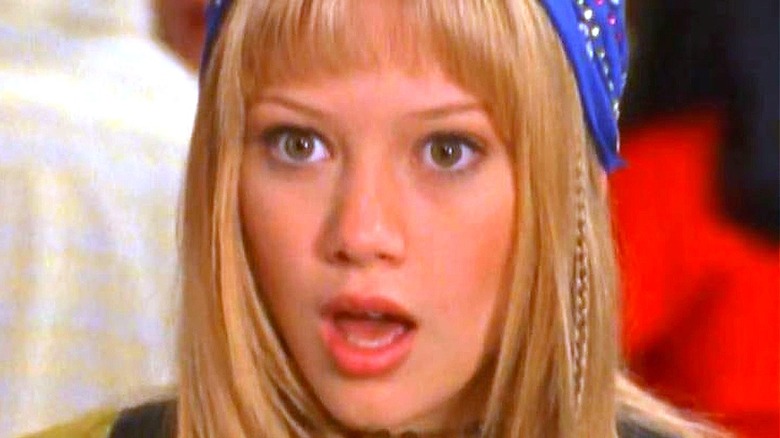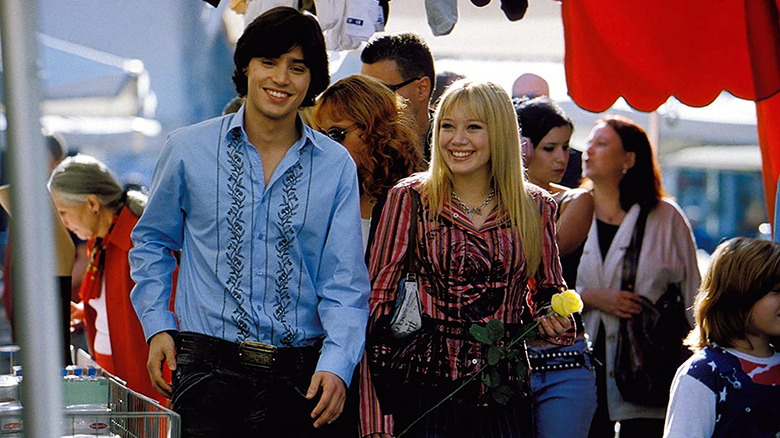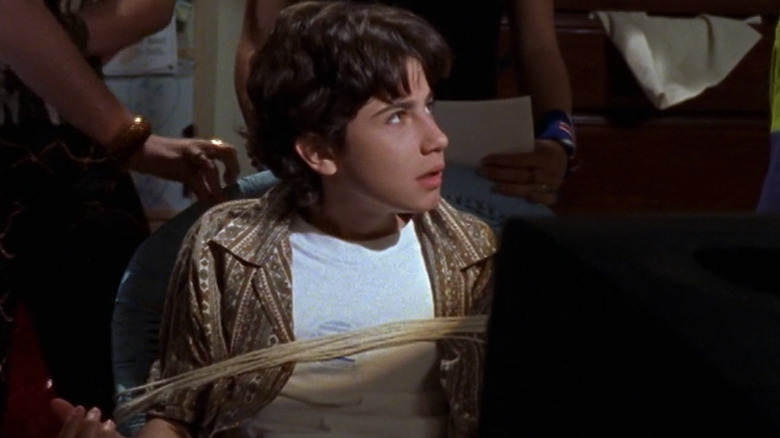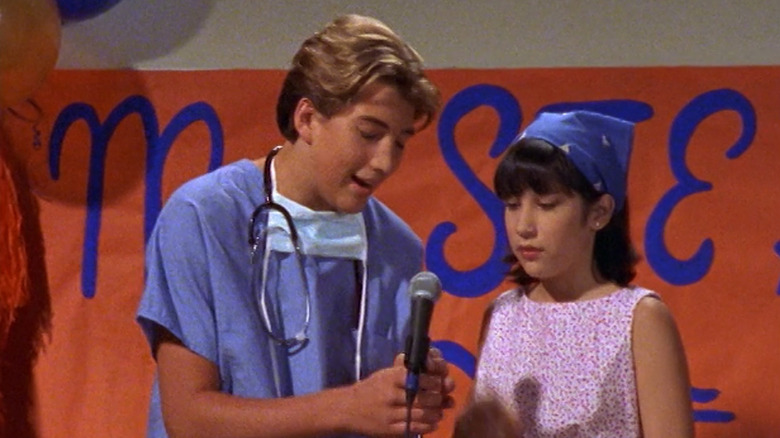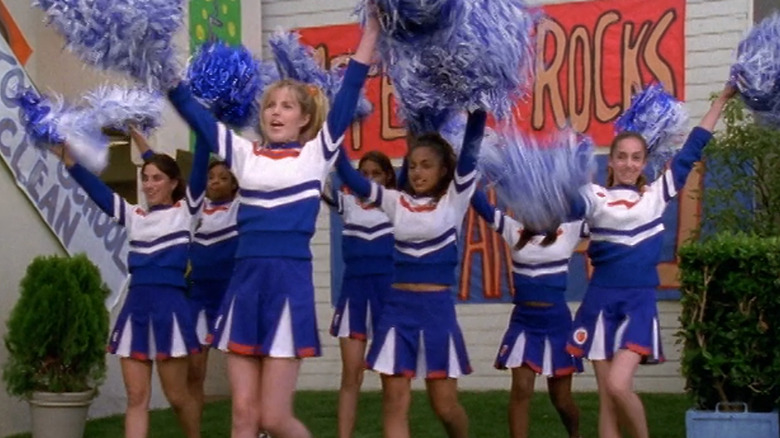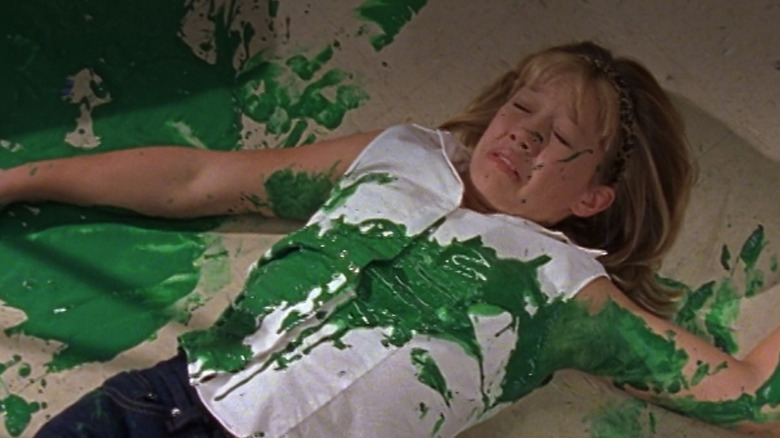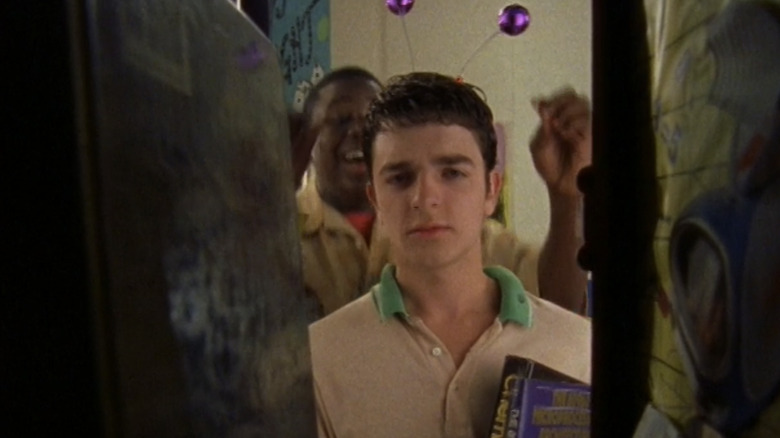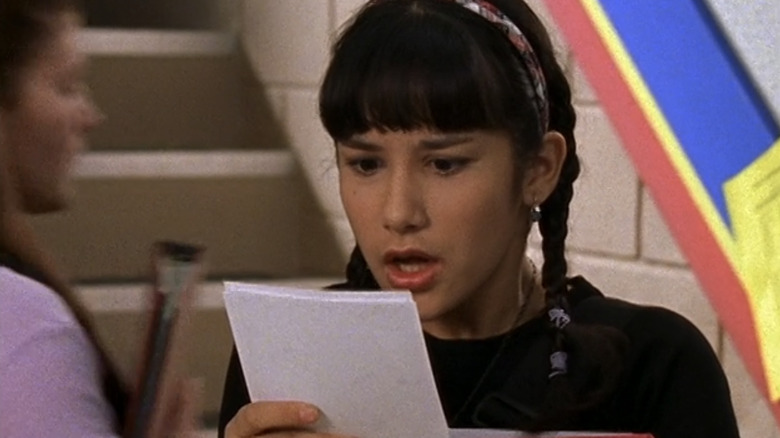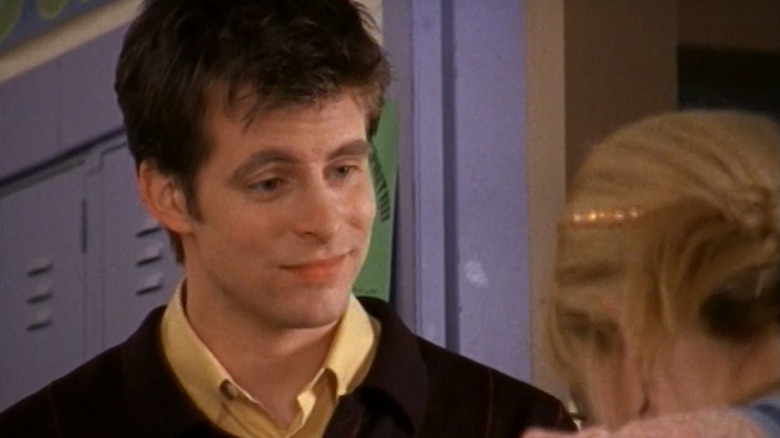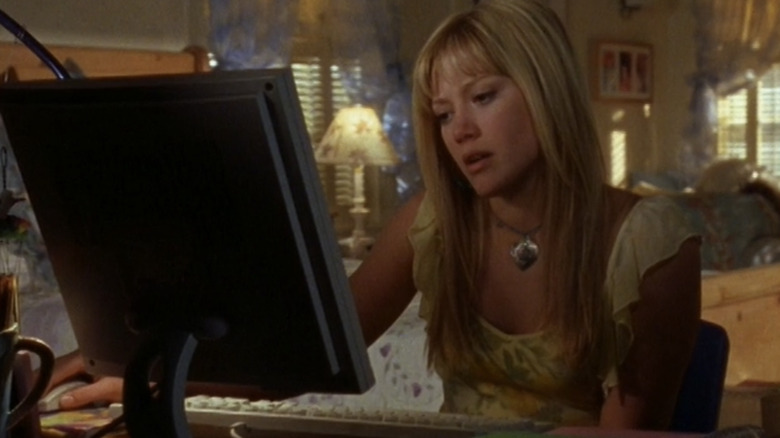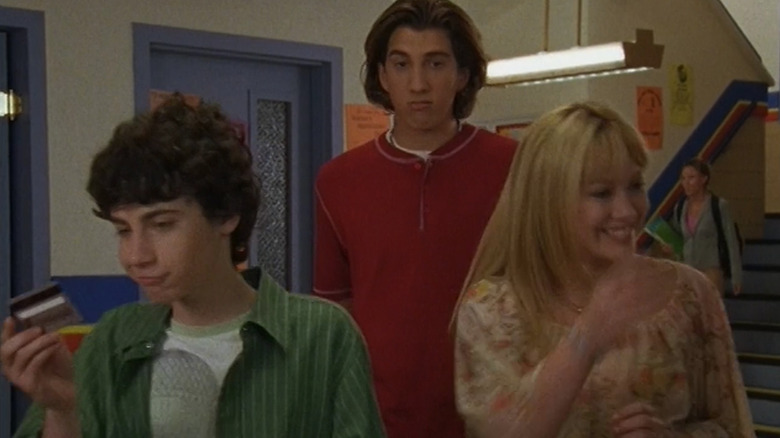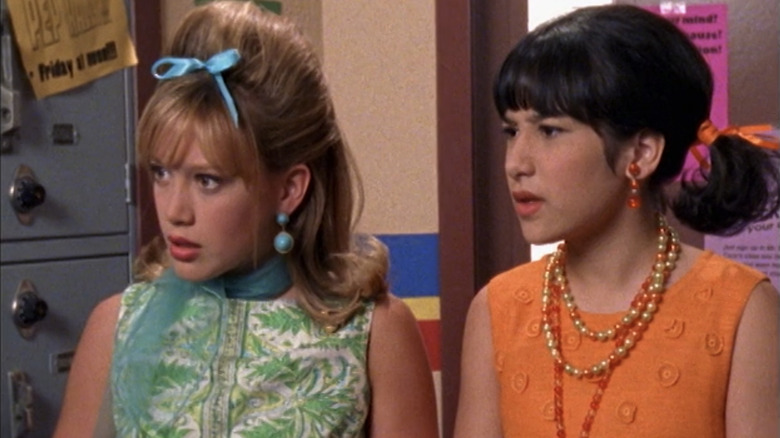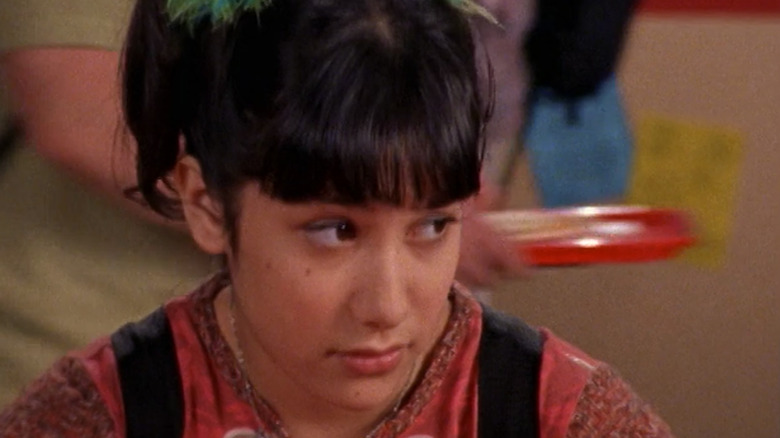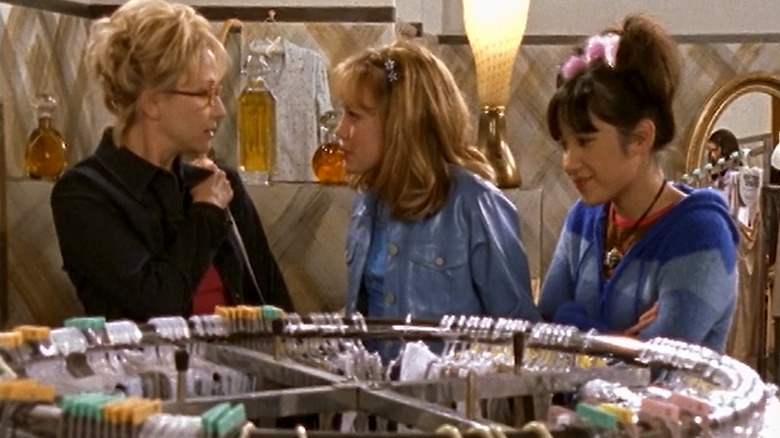Questionable Things We Ignored In Lizzie McGuire
There is a lot to adore about Disney Channel's original series "Lizzie McGuire," but as a show that aired between 2001 and 2004, it also featured a plethora of situations that were improperly handled — many of which were easy for viewers to overlook, especially if they were teens themselves at the time. "Lizzie McGuire" follows its nominal character, played by Hilary Duff, as she navigates trying times in middle school alongside her best friends Miranda Sanchez (Lalaine) and David "Gordo" Gordon (Adam Lamberg), her parents (played by Hallie Todd and Robert Carradine), and her younger brother, Matt (Jake Thomas). As a prodigious success throughout its 65-episode run, the series concluded with a theatrically released film, "The Lizzie McGuire Movie."
Because "Lizzie McGuire" was written as a pre-teen TV show — and aired at a time when broader, more inclusive conversations weren't happening on social media — there are plenty of things writers were able to get away with when it came to plot holes, questionable remarks, and even glossing over certain situations that today would require ample research and sensitivity to execute more appropriately. Furthermore, unlike one of its known Disney Channel predecessors, "Boy Meets World," when it came to exploring heavier topics, "Lizzie McGuire" underperformed as a direct result of not having a chronological order in its episode air dates. Now that the series is streaming on Disney+, the order the episodes stream in contributes to the clunky storytelling that always had so much more potential.
13-year-olds go to Rome with limited chaperoning
Widely regarded as the series' grand finale, "The Lizzie McGuire Movie" sees the students go on a class trip to Rome following their middle school graduation. Alarmingly, though, they've only got one main chaperone, Miss Ungermeyer (Alex Borstein). As a result of this, sneaking off is far too easy the majority of the time. So often TV shows expect audiences to suspend disbelief in such scenarios, but it doesn't make it any less questionable that 13- and 14-year-olds are sneaking off unattended in a foreign country with locally known pop stars. And since Paolo Valisari (Yani Gellman) turns out to be a fraud, who knows what else he could have been capable of.
The entire film borders on setting a harmful example of being taken advantage of, while ultimately glossing over the dangers of what it means to be a child experiencing such a glorified form of success: So much of television and film in the early 2000s forgot that pre-teens were still very much kids. "The Lizzie McGuire Movie" places minors in strange settings and allows them to sneak off and perform with people they barely know, which could be incredibly dangerous. The fact that there aren't enough chaperones to look out for Lizzie to begin with is deeply questionable.
Oversimplification of addiction
In "Gordo and the Magic Dwarves," Lizzie, Miranda, and Matt perform aversion therapy to help Gordo snap out of his "Dwarflord: The Conquest" obsession. When it seems as though Gordo is neglecting everything but the game, and he refuses to listen to anyone, his friends take matters into their own hands. Aversion therapy isn't to be taken lightly — it's a serious (and controversial) physiological treatment that utilizes the concepts of classical conditioning by pairing the patient's undesirable behavior with discomfort, such as snapping a rubber band on the patient's wrist each time they repeat the unwanted behavior.
Addiction is a disease that many shows even in relatively mature genres tend to gloss over; thus, placing it front and center and letting pre-teens attempt to handle it like professionals isn't the kind of example "Lizzie McGuire" should've tried to set. Sure, the actual process of aversion therapy is more gruesome than the version depicted in this episode — but it still isn't a matter that should have been dealt with lightly ... or, arguably, at all.
Kids have obsessions all the time — frankly, if one looked at Lizzie and Miranda and their obsession with fashion, they could have been placed in the same category as Gordo and his obsession with the game. Yes, each is unhealthy in its own way, and boundaries are necessary, but toying with actual procedures that should be performed by professionals, while trivializing the experience of addiction, is deeply disturbing.
If you or anyone you know is struggling with addiction issues, help is available. Visit the Substance Abuse and Mental Health Services Administration website or contact SAMHSA's National Helpline at 1-800-662-HELP (4357).
Marriage project in social studies class goes awry
In the episode "I Do, I Don't," the series takes career goals and future planning to questionable lengths when students are paired up in a "marriage project" for their social studies class. However, are their adult careers chosen for them without their input, but two of the students, Ethan Craft and Kate Sanders, take it one step further and plan to execute an affair. Sure, career planning and even treating sacks of flour like babies were things middle school students actually dealt with in the real world, but "Lizzie McGuire" took it too far when the project wasn't simply regarded as homework but instead played out as a form of fantasy storytelling.
If properly guided by teachers and adults, the project could have been far more informative, illuminating the difficulties presented by marriages and career choices in adulthood. Instead, though, it became more of a glorified gossip labyrinth where who was married to who mattered far more than the project itself — and the harmful example it set by focusing most of the episode on the alleged faux affair and infighting among friends was a questionable choice that's still hard to understand today.
The cheer squad lacks adult supervision
As was the case in many films and TV shows at the time, the cheer squad bullied everyone beneath them on the social ladder, and in "Lizzie McGuire," there's seldom any adult supervision when any of this harmful behavior occurs. Real middle and high schools (should) almost always have faculty present to supervise the underage students, but when the bullying happens on "Lizzie McGuire," none are ever around.
With the cheer squad in particular, the cheerleaders have complete autonomy. While this is realistic to some degree, there's still the necessity for an adult coach or supervisor who's in charge of the entire department. As a result of the lack of oversight, the squad is able to completely belittle and kick out one of their own in "The Rise and the Fall of the Kate Empire." Kate Sanders is demoted as a captain and thrown out of the cheer squad when she injures her shoulder, and worst of all, this is done by another member of the squad without a single adult to intervene in the matter. It's a showcase of toxic friendship for starters; the lack of compassion and empathy makes the moment incredibly troublesome. But more than that, it exposes the fact that these kids have far more "power" than they should as pre-teens — especially over each other.
Students are rarely reprimanded
The inconsistency between students getting detention for something destructive they've done versus getting away with something equally (or more) disruptive is far too frequent on "Lizzie McGuire." In "Picture Day," we witness yet another casualty of the lack of adult supervision in the cheer squad when a student spills paint on another student in order to ruin their outfit. This attack is plotted by Kate, a cheerleader, and it's met with absolutely no remorse or punishment. Granted, crime and punishment aren't central to this episode's theme, but this problematic pattern continues all throughout the series.
There are a few occasions where the students are called out for their behavior, but it only happens when it's servicing the plot and never does anything for character growth. Whether it's the cheerleaders or other bullies, this is the area where students could use considerably more serious talks to help them understand that what they're doing is harmful to others. At the very least, they should learn that it's not something they should get away with ... But instead, the series left most of the consequences unresolved. The bullying was never addressed by adults, and the one time Lizzie McGuire gets detention, it seemingly does more harm than good when she befriends a known troublemaker. This interaction, too, once again showcases the fact that these pre-teens are overwhelmingly left to their own devices when they should be looked out for more carefully.
Larry Tudgeman is constantly bullied
In almost every show from this era, there's always one student who is relentlessly bullied, and that student in "Lizzie McGuire" is Larry Tudgeman (Kyle Downes). Up until the episode "My Fair Larry," where he's given a physical makeover to sneak into a party he was purposely excluded from, everyone in the show mocks Larry for being an outsider — a "Trekkie," as he'd call it — at some point. And when he finally expresses that his feelings are actually hurt, it's the first time Lizzie actually takes into consideration that they've been unkind to him.
The fact of the matter is, the issues brought up around Larry are so stereotypical and toxic that they did too good a job of encouraging younger audiences to shun kids who were different from them. He even mentions once when she's running an advice column that he doesn't know to get the other kids to like him. As a show that is not very diverse, focuses quite heavily on traditional standards of beauty, and is set in middle school, "Lizzie McGuire" depicts a fair amount of bullying. It specifically targets Larry Tudgeman, but also affects other characters — including Gordo, who is at one point rejected for his height. These aren't exactly the kinds of messages you want to send to middle school audiences who are navigating their own insecurities.
Dieting is glossed over
In an episode titled "Inner Beauty," the series glosses over extreme dieting when it depicts what could easily be the beginnings of an eating disorder. It's a struggle many people go through, often starting in the middle school years, but it should require trigger warnings when portrayed on a TV show — especially one created for pre-teens. A focus on prevailing beauty standards is pervasive in entertainment, but it's nonetheless an incredibly problematic storyline when Miranda is suddenly struck by how she looks in a photograph taken by Gordo and goes on a crash diet to lose weight. Her friends discover this when she almost faints while rehearsing for a music video!
Dieting can be extremely triggering for viewers with eating disorders, not to mention particularly harmful subject matter for impressionable teens and tweens. As a series, "Lizzie McGuire" should never have addressed the storyline as lightly as it did. While the endgame is ultimately to highlight Miranda's inner beauty and promote the idea that outer beauty is subjective, such sensitive storylines require far more research, careful consideration, and proper execution. Pre-teens audience members who are going through the same struggles could be negatively impacted by the episode — and no one, especially a young person whose body is still growing, should be encouraged to diet to the point of passing out.
If you are struggling with an eating disorder, or know someone who is, help is available. Visit the National Eating Disorders Association website or contact NEDA's Live Helpline at 1-800-931-2237. You can also receive 24/7 Crisis Support via text (send NEDA to 741-741).
A questionable showcase of student-teacher relations
In "The Greatest Crush of All," each of the girls develops a crush on their new substitute English teacher, Mr. Ewan Keith (Grant Thompson), even going as far as to fight for his attention. The teacher at one point invites them to his poetry reading, even singling out Lizzie because she seems to understand the material better than others. It's harmless on the surface, sure, but TV and film have often glossed over such scenarios as innocent when ultimately, it's quite detrimental in terms of the boundaries it overthrows in favor of plot.
A college professor inviting students to a poetry reading would be one thing, but when it's 13-year-old girls, it's a completely different story and a boundary that shouldn't be crossed. Additionally, to extrapolate from this storyline, many places such readings take place aren't suitable for pre-teens without supervision, like bars or even college campuses. The idea of Mr. Keith reading romantic poetry while the female students swooned and got tongue-tied over him echoes what grooming actually looks like when it goes unnoticed. But instead of addressing it, the sequence harped on the idea that it's harmless, innocent, and even funny. In short, it set the kind of example that could mislead younger students toward a skewed version of normal student-teacher relations. It isn't okay when it happens to any students, and certainly not in a storyline surrounding middle schoolers.
Pre-teens start an advice column
In an episode titled "Dear Lizzie," Lizzie starts an advice column for the school magazine, and the results prove to be harmful when she gives advice on topics pre-teens ultimately don't know enough about. (When someone writes that they can't stand their sister, Lizzie suggests that they move to a different state for college!) The faculty advisor in charge of the school paper knows next to nothing about what she's doing and seldom even contributes because she's written as a ditzy, frightened teacher whom no one takes seriously.
When Lizzie confides in her parents that the column is no longer headed in the right direction, her father states that she can't control everything and should do the best she can. However, no one acknowledges the detail that pre-teens don't really have the life experience to be giving serious advice — and once again, especially without adult supervision, it proves to be something that works out for the sake of plot but ultimately causes a good deal of harm. Middle schoolers are not really in the position to help with the kinds of issues their peers are going through, some of which involve serious issues like bullying; why aren't any of the adults helping? The expectation that Lizzie will take on more than one serious issue at the same time requires the kind of insight that only a professional possesses.
Gordo gets a platinum credit card offer
It takes some adults with good credit scores years to be given a platinum credit card offer, but in "Gordo Shuffle," Lizzie's best friend Gordo is offered a platinum card — signed to his name and everything! Then, when his friends finally convince him to use it, he maxes it out trying to finance his own movie. This might be the most questionable episode of all, because ... How? Truly, how on earth and from where on earth does the offer even reach a 13-year-old?
A pre-teen with no job getting a credit card is unrealistic, not to mention that pre-teen financing a film and working long hours every day without adult supervision. There's even a point when the pizza delivery driver takes the credit card and cuts it in half because it's been declined. This raises eyebrows for more reasons than one, primarily because no one would ever dare to do such a thing to someone else's property.
Leading up to Gordo maxing out the card, at no point does anyone even question the amount that's being used or whether or not making the film is a thoughtful plan at all. None of the adults explain responsible credit card use (even for the benefit of kids in the audience), and we never learn how many of his purchases Gordo was able to return. The consequences of his reckless behavior aren't addressed ever again, and audiences are simply meant to suspend disbelief and assume that it all turned out well in the end. If only real credit card debt were that easy to resolve.
Constant gatekeeping
Gatekeeping isn't an idea that was discussed in the early 2000s as much as it is today, but it's nonetheless present in multiple episodes of "Lizzie McGuire" when various characters want to be the only person to love or appreciate something.
When Gordo is obsessed with Rat Pack's lounge lifestyle, he objects to other students joining on it and even gets angry at Lizzie and Miranda for making it into a "fad." In another episode, "Picture Day," Kate objects to Miranda wearing an outfit because she's also wearing the same outfit; she even plots to ruin it for Miranda so she can be the only one wearing it. Even Gordo's obsession, "Dwarflord: The Conquest," is an extremely exclusive game limited to certain players. In the Halloween episode titled "Night of the Day of the Dead," Kate makes it clear that no one else can dress as Vampira, as that's the costume she's chosen, which forces Lizzie to wear a clown costume instead.
It seems harmless to a degree, but when all instances — far greater in number than the ones listed here — are taken into consideration, the series seems to condone inadvertently robbing another person of their agency.
Miranda leaves school for an extended period of time
When Miranda Sanchez, Lizzie's best friend, suddenly disappears from multiple episodes, we're constantly told she's visiting her family in Mexico City. While speculation began stirring about whether or not it was the star Lalaine's choice to leave, whatever the case, the way the series handled her departure was incredibly unrealistic. At no point could a 13-year-old just leave school to go on vacation for a long period of time without falling too far behind.
Additionally, throughout multiple episodes that aren't even in chronological order, the narrative continually changes, creating a vexing plot hole no one at the time understood. The early 2000s had a habit of putting too much on a pre-teen character's plate, while never acknowledging legality issues or the fact that all their extracurriculars and shenanigans could prevent them from meeting the school's curriculum.
If Miranda wasn't meant to return (and she didn't in the film), the writers should have given her the kind of closure that would allow audiences to know she'd be moving elsewhere. (That way, they wouldn't have to come up with crazy fan theories, like the one that suggests Miranda was never even real.) The way the narrative bounced around was a disservice to both the character and the story. While spending time with family is important, it's certainly questionable that a teen, and Miranda Sanchez especially, would choose a family trip over a once-in-a-lifetime opportunity to travel abroad with her friends.
Needing a bra shouldn't be questionable
One of the most iconic and oft-referenced episodes in "Lizzie McGuire" history is "Between a Rock and a Bra Place." Lizzie and Miranda start off by trying to disguise the fact that they need bras, only to have Lizzie scream about it when her mother keeps pressing her. While conversations surrounding feminine products are still somewhat taboo in mainstream media, especially in programs targeted toward younger audiences, the act of painting its subject matter as taboo is precisely what makes this storyline questionable. The bra issue itself isn't nearly as questionable as the episode's means of approaching it: It should have never been such a secretive issue that pre-teen girls would need bras.
Placing such awkward emphasis on a basic necessity contributes to the harmful narrative that women, especially young women, need to tread lightly around asking for what they want or need to get through everyday life. While a teen TV episode wouldn't necessarily include this type of arc in 2021, it's still a questionable part of the series that demands discussion today. Why aren't the moms aware of their daughters' developing needs in the first place? Where is Miranda's mom in the episode? Why does a bra determine whether a middle school girl is cool or not? There's literally a conversation about how Kate Sanders' popularity began the day she started wearing one. This episode really could have set a better example for young viewers.
